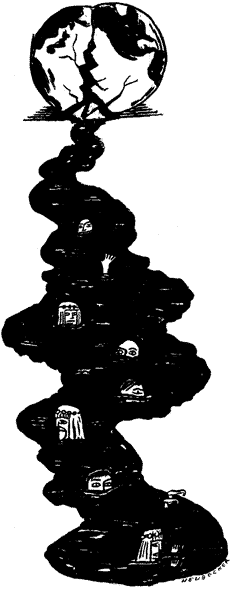OPEC's Oil Shock
Technology--and futures traders--have freed world supplies from the cartel's grasp.

They remain some of the most evocative images of the 1970s, those film clips of sheiks clad in flowing robes and luxuriant headdresses, striding confidently from hotel lobbies into waiting limousines, secure in the knowledge that in controlling two-thirds of the world's oil reserves, they controlled the lifeblood of the industrialized world. This was what the revenge of the Third World looked like, it seemed. Every new OPEC meeting, every new increase in the price of oil, spelled an end to Western hegemony.
Well, maybe not.
When OPEC met at the end of last month and decided to expand its production quota by 2.5 million barrels a day, the announcement was front-page news, but the contrast with OPEC meetings of two decades ago could not have been sharper. Instead of a tightly disciplined cartel administering prices to a supine world market, OPEC more closely resembles a fractious trade association struggling to bring supply in line with demand even as its efforts are sabotaged by its own members. And instead of being the sole ruler of the world's oil fields, OPEC has watched its control of world prices disappear, as dramatic technological advances in exploration and production have made new oil reserves--largely controlled by Western companies--appear where there weren't any before. OPEC's production decisions still make a splash on the spot-price and futures markets, which have also been roiled by the announcement that Iraq will be allowed to resume its oil-for-food sales. But splashes are all they are.
In part, that's simply because OPEC has proved incapable of successfully restricting its output. The most recent quota increase, for instance, will raise the cartel's daily production to 27.5 million barrels. But most estimates suggest that OPEC countries are pumping out 28 million barrels a day already--the quota increase is designed mainly to allow to bring its share of the world market more in sync with its enormous capacity. The Saudis could single-handedly depress the market by flooding it with oil, as they did in 1986 in order to discipline recalcitrant OPEC members. But cutthroat price competition is generally not a textbook recipe for profitability.

N either, on the other hand, are artificially high prices, the other reason for OPEC's fall from grace. In the short run, the massive price increases of the early and then late 1970s brought huge windfall profits to OPEC members (and, to a lesser extent, to the Western oil companies that still handled much of their production). But those price increases ultimately provoked two predictable responses: Demand for oil shrank, as consumers looked for substitutable sources of energy; and, more importantly, the search for oil expanded. When OPEC raised its prices far above its production costs, it made sense to develop fields that previously had been too expensive. If farmers in the United States suddenly decided to charge $5 for a pint of cow's milk, you can bet supermarkets would start selling milk from China if they could get it here at a reasonable cost.
Actually, that analogy doesn't really capture just how momentous the technological transformation of the oil industry has been. The last decade and a half has witnessed a steady decline in the cost of finding and producing oil. Three-dimensional seismic computer modeling now allows engineers to discern previously undiscoverable oil and gas deposits. The development of horizontal drilling, where drill bits actually go sideways from a vertical hole in order to extract more oil, has also helped make the exploitation of smaller and less accessible fields cost-effective. All this has meant that the world's "proven oil reserves" (fields ready for production) are 60 percent larger now than in 1980. The latest craze is even more astounding: Thanks in part to federal tax breaks, U.S. companies are embarking on deep-water drilling projects in the Gulf of Mexico that involve taking oil from fields that lie as much as a mile underwater. It's got to the point where the chief economist of Venezuela's state oil company can say with a straight face, "Our reserves are--for all intents and purposes--infinite."
The infiniteness, of course, is imaginary. Although oil is a commodity, it's still not a commodity like coffee, which, thank God, we will have with us always. At some point the oil will run out. But that point now seems so far in the future that oil countries are acting as if it will never arrive, and that has had a major impact on their attitudes toward production. If your reserves are finite, after all, you need steady price increases over time to justify leaving any oil at all in the ground. (Otherwise, every producer has an incentive to drain all its reserves, take the money, and reinvest it in a more profitable enterprise.) That means restricting supply. If your reserves are infinite, though, it makes sense to worry less about price and more about maximizing output, since your source of cash is never going to dry up and force you into another line of business.
The problem, of course, is that--as with overcapacity everywhere else--if everyone maximizes output, everyone loses, because the price falls precipitously. The oil market is especially sensitive even to a hint of expansion or contraction in supply. When Saudi Arabia killed the market in 1986, sending oil prices down by two-thirds, it did so while expanding the world's oil supply by just 3 percent. Oil-futures traders may not look like sheep, but those were baaas I heard the last time I walked by the New York Mercantile Exchange, where the futures are swapped. And that helps explain why OPEC continues to struggle to keep its members in order and maintain a public production quota. It wants to keep prices high enough to ensure profits but low enough to deter the development of new fields. But the instruments it has to do this with are blunt compared with the authority it wielded two decades ago.
Mocking futures traders may be fun--actually, it is fun--but they have been crucial figures in the eradication of OPEC's ability to dictate prices. Before the 1980s, there was no futures market in oil, nor even a real spot market for crude oil. (A spot price is the price for one cargo of oil, generally delivered within a month.) That made it difficult for consumers to compare prices and locked them into relationships with producers. It also meant that there was no way to hedge against future price increases, which obviously gave producers tremendous leverage. The rise of the futures market and the broadening of the spot market brought price competition to the world of oil. Now, it's still rather difficult to put a rig in the middle of the Gulf of Mexico, and the largest producers do still exert a disproportionate impact on the market as a whole. But, for the first time in history, there is now a relatively open market for oil. And that undoubtedly has something to do with the dramatic expansion of the industry's productivity.
Of course, it is an open market that depends upon the U.S. Sixth Fleet to protect it. But then that's why I said "relatively."